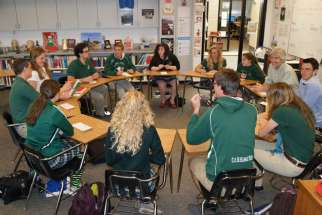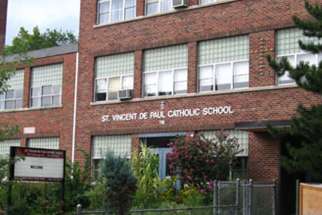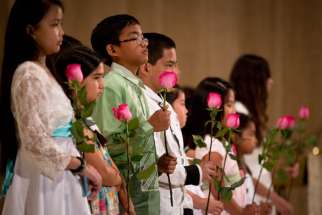Schools to teach sex ed through Catholic lens
OTTAWA - Ontario Catholic authorities believe Catholic teaching is protected in the province’s new sex education curriculum, though pro-family groups don’t share in that optimism.
Pakistani Catholic official calls attack on school 'barbaric, inhuman'
NEW DELHI - The Catholic Church in Pakistan has joined the chorus of condemnation of the deadly attack by Taliban on an army school in Peshawar that has left at least 126 children and others dead and 250 injured.
Prayer integral in our schools, but there’s more that can be done
Part of the mandate of Catholic schools is to ensure that students develop an appreciation and understanding of the role of prayer.
Catholics continue to answer the call
A century of Catholic education
TORONTO - It’s hard to argue when Krystyna Dix says there’s something special about St. Vincent de Paul Catholic Elementary School.
We owe our children a better discussion
This month 673,000 students were registered to attend English and French Catholic schools in Ontario. Their registration is a choice made by parents who value and acknowledge the importance of Catholic education for their children.
Commuter-school chaplaincies ‘gather the scattered’
Toronto - With Toronto’s universities heavily populated by students who live off-campus, on-campus Catholic chaplaincies work hard to keep commuters coming back.
“Everyone has a different experience with chaplaincy,” said Joseph Zambon, a pastoral assistant at York. “Some members just come for Sunday Mass while other members just go to one-time events held by the chaplaincy throughout the school year.”
At the University of Toronto, the approach of the Newman Centre chaplaincy is to break it down into smaller, more focused groups. This builds a stronger sense of community with its members. There is also one major retreat for students each term as well as regular services such as Mass seven times a week and adoration after every Friday Mass. The Newman Centre also hosts “A Date to Remember,” a popular speed-dating night for single Catholic young adults.
York University’s chaplaincy team, which is located on the Keele campus about an hour north of downtown Toronto by public transit, deals almost exclusively with commuters. Because of this, the chaplaincy has very little activity over the weekends, except for Sunday Mass.
The bulk of its services run from 10 a.m. to 4 p.m. on weekdays, when the campus is alive with students and when they can come and go depending on their class schedules. When the campus virtually shuts down on the weekend, so too does the chaplaincy team for the most part.
Despite the lack of weekend activity, the York chaplaincy enjoyed a successful welcome week on campus. It celebrated a “Blitz Week” handing out popcorn, doing surveys and questionnaires to raise awareness about the chaplaincy. The most recent event, Grill the Priest, was held on Sep. 18 and Sept. 20 in the early afternoon. Students had a chance to ask a priest any tough questions about the Catholic faith.
The Ryerson University chaplaincy, located at the heart of downtown Toronto, estimates that 50 per cent of its student members commute more than 45 minutes to get to school.
“It has been my experience that commuter students are eager and excited to get involved. They have a desire to join a student group precisely because they are a commuter student and they want to feel connected to the campus,” said Oriana Bertucci, chaplaincy director at Ryerson.
Ryerson’s chaplaincy also takes on the role of “gathering the scattered.” The chaplaincy group meets students where they are: on campus, at a coffee shop, at a church or other places Ryerson students hang out. The concept allows the chaplaincy and its events to be more accessible to students regardless of whether they commute or live near campus.
The Ryerson chaplaincy plans most of its events during the day time or early evenings to agree with the schedule of its large commuter group. In addition, the chaplaincy provides a place for prayer in the large space of the St. Michael’s Cathedral. It also holds themed monthly Sunday dinners to encourage interaction with other student groups on the Ryerson campus.
“Our Sunday dinners often attract students who enjoy going to Mass with their friends and having the opportunity to break bread afterwards. Even if they have to travel a bit to come for Mass and dinner, they enjoy the fellowship,” said Bertucci.
“How we define growth in the chaplaincy is by answering: Are we meeting the needs of our students?” Bertucci said. “We need to be adaptable.”
(Jereza is a second-year journalism student at Ryerson University.)
French board numbers on the rise
While many of their Anglophone counterparts struggle with declining enrollment, the French Catholic District School Board of south-central Ontario opened three new schools this year to accommodate an increasing student population.
“The school board has an increase of students every single year and this year is not different,” said Réjean Sirois, director of education for the French Catholic school board which services south-central Ontario. “We’ll be over 14,500 students this year. It is an increase of four per cent.”
Since 2006 the student population has increased by about 2,500, placing a heightened demand on the board’s infrastructure.
On Sept. 4 the doors opened to the French board’s new elementary schools, École du Sacré-Coeur in Toronto and École Eléméntaire Catholique Notre-Dame-de-la-Huronie in Collingwood, Ont. Meanwhile in downtown Toronto students of École Secondaire Catholique Saint-Frère-André, who were formerly educated at West Toronto Collegiate Institute, explored their new home-away-from-home.
Formed in 1998 the board is responsible for a geographic area stretching from the Niagara Peninsula to Georgian Bay. Currently the board, one of eight French first-language Catholic boards in the province, operates 51 schools across the more than 40,000 square kilometres it services.
“There is a demand for a French first-language Catholic education and it has been like that for the past eight or nine years,” said Sirois. “There are several factors for the increase in our student population but mainly (it’s because) we’re putting schools where we didn’t have schools before. In certain regions where we didn’t have schools we’re now offering the service.”
This year’s additions do not represent the end of expansion for the board either. There are three more facilities in the works.
“As we speak we are building two new schools and pretty soon we’ll start building another school for Oakville,” said Sirois.
While Sirois admits there are several factors which have led to this continuous growth, there is one component which stands out — parental awareness.
“People are more aware now that there is a French Catholic school board where the instruction is done in a French first language,” he said. “With all the publicity and the effort from our communication department we have been able to reach more parents.”
Although the curriculum follows the same provincial standards as the English boards, all of the material, social interaction and extra-curricular activities are French-spoken only, said Sirois, detailing the difference between his board and the public system’s French immersion programs.
“We recognize the excellent work of our parents who support their children in French education,” said Sirois. “We’re lucky to have devoted staff dedicated to the difference of French Catholic education and it’s a good place to be, let me tell you, it’s a good place to be right now.”
Ontario's Catholic school trustees seek change to McGuinty's Putting Students First Act
Ontario’s Catholic school trustees are pressing for changes to Dalton McGuinty’s Putting Students First Act and insisting that Catholic school boards should not be legally bound to new teacher contracts imposed by the government.
OCSTA officials will continue to push for amendments to the act to remove contentious clauses that strip school boards of important management rights pertaining to teacher hiring and student testing, said Bob Murray, OCSTA director of legislative and political affairs.
Under the proposed new law, Catholic boards will be required to operate by more restrictive policies than the province’s public boards. That inequality was created in late August when the government backtracked on Putting Students First and returned to French and public boards the right to negotiate non-salary issues with their unions. But the same right was denied to Catholic boards.
The government had previously done a deal and signed a memorandum of understanding (MOU) directly with the union that represents Catholic teachers, the Ontario English Catholic Teachers’ Association (OECTA). That deal was negotiated without input from Catholic trustees and their boards, and was allowed to stand after the government relented to opposition party demands to amend Putting Students First.
“While the union has signed, the boards themselves, as the legal employer, refused to sacrifice those rights (pertaining to hiring and testing) that are legally theirs,” Murray said. “So, for no reason should they be legally bound to an agreement they didn’t sign.”
Five Catholic boards had previously agreed to accept the terms negotiated between the government and OECTA and, said Murray, those boards are legally bound to honour the contract they signed. But OCSTA believes the other 24 Catholic boards should have the same negotiating rights as the public boards.
“We have these agreements that were not reached according to the legal collective bargaining process,” said Murray, adding that “labour relations rights of employers and employees have been violated.”
The trustees are concerned that granting teacher unions more input in hiring and a greater say in managing diagnostic testing will negatively impact the quality of education. In a statement, OCSTA expressed concern that decisions about education are being made for reasons of political expediency.
“These rights are important because of the impact they have on students and the quality of education delivery,” said Murray
OCSTA officials were to meet with Liberal and opposition party members to make their case for change.
“There will be opportunities for amendments to be put forward and our hope is that the opposition parties will continue to push very strongly to have these two issues fully removed from the legislation,” said Murray. “Our intention and our desire would be for the bill to be amended further to remove those two provisions to be bound to any board at this point.”
According to a government spokesman, a final vote on Putting Students First is not expected before Sept. 10.










